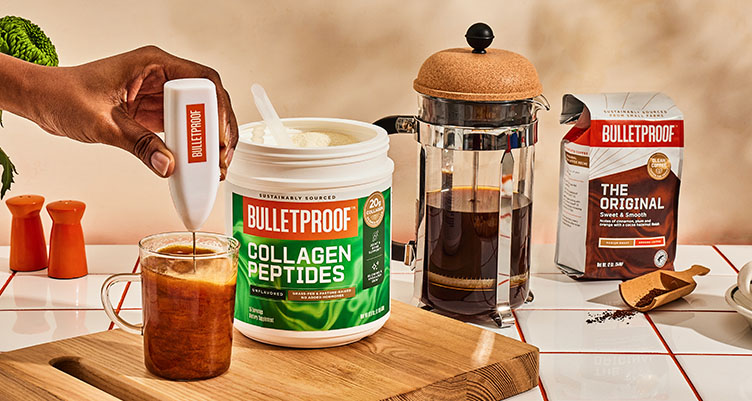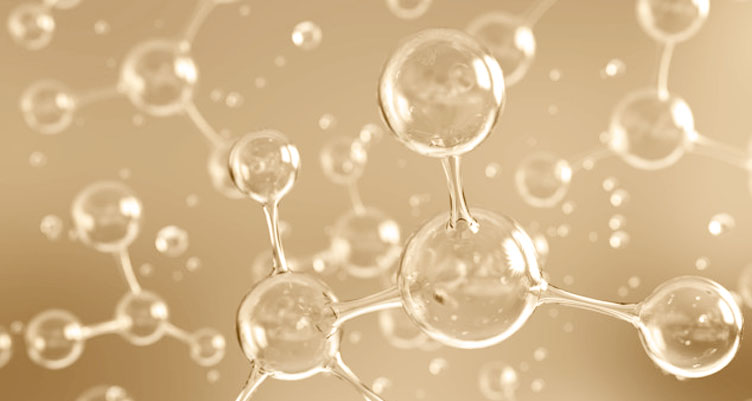What is Hydrolyzed Collagen and Why Are People Adding It to Everything?

- Hydrolyzed collagen, also known as collagen peptides, collagen protein or collagen hydrolysate, is more than just protein powder.
- Collagen contains amino acids your body uses to form the connective tissue in your skin, hair, nails, bones and joints. Hydrolyzed collagen is broken down into smaller molecules so it’s easier to absorb.
- Add hydrolyzed collagen powder to your favorite drinks, meals and baked goods. You can also find it in Collagen Protein Bars and Collagen Peptides powders.
Want to reduce wrinkles, support joint health and add more protein to your diet? Hydrolyzed collagen is the best way to cover all your bases (and feel great doing it).
Also known as collagen peptides or collagen protein powder, hydrolyzed collagen is more than just protein powder: It’s packed with the amino acids your body needs to build and repair your skin, bones and joints. Plus, it’s easy to add to your favorite dishes, baked goods and daily essentials like Bulletproof Coffee.
Here’s everything you need to know about this all-in-one supplement, including what the heck “hydrolyzed” means.
What is hydrolyzed collagen?

Collagen is the largest and most abundant protein in the body. It forms the connective tissue in your skin, hair, nails, bones and joints. Unless you regularly devour organ meats and spend hours preparing bone broth, you likely need more collagen in your diet.
That’s where hydrolyzed collagen powder comes in. This popular supplement is an easy way to add more collagen to your diet because it’s flavorless, odorless and mixes so easily with pretty much any liquid—and it’s all thanks to that hydrolyzing process.
The science of hydrolysis

“Hydrolysis” sounds funky, but it just means using water to break a protein bond. Like digestion, hydrolysis converts collagen into smaller molecules. These molecules are easier to absorb into your bloodstream. Collagen can be hydrolyzed with chemicals and enzymes.
The easiest way to think about this process is to think about all the steps involved with digestion. You break down your meal into smaller parts by chewing it, and then it gets broken down into even smaller particles in your stomach so your body can use all the nutrients from your food.
Hydrolyzed collagen vs. collagen peptides
You’ve likely heard of collagen peptides, collagen powder and collagen hydrolysate. What’s the difference?
Functionally, all three are the same thing. All are used interchangeably in the protein industry to describe hydrolyzed collagen.
Shop Bulletproof Collagen Peptides
Hydrolyzed collagen benefits

Amino acids are the building blocks of protein, and collagen is packed with three important ones: glycine, proline and hydroxyproline. Your body uses these amino acids to make new collagen.
That’s great news for anyone, but especially as you age because it’s normal to produce less collagen over time. Here’s more detail about the health benefits of hydrolyzed collagen.
Better skin, hair and nails

Not only does collagen make your hair and nails strong and shiny, but it also combats the effects of aging. Collagen reduces the appearance of wrinkles and improves skin elasticity, as well as increasing skin hydration and smoothness.[1][2]
How? Consuming collagen encourages your body to form new collagen, which is a big deal. It forms 75-80% of the skin in the dermis, the layer that gives skin its fullness. To learn more about how collagen can benefit your skin, see our collagen benefits for skin guide.
Strong joints and bones

Hydrolyzed collagen can decrease joint pain after exercise and helps makes your joints more flexible.[3] This is a big deal if your preferred form of exercise is tough on your joints, like running and martial arts.
Collagen is a particularly great option for athletes because it promotes recovery. Your body uses collagen to build everything from connective tissue to tendons, so having those amino acids more readily available can support your performance in the gym or on the track.
Related: How Do Collagen Supplements Work? What the Science Says
How to use hydrolyzed collagen

You’ll find hydrolyzed collagen in tons of different products, like powders and protein bars. But before you start whipping up collagen beauty elixirs and collagen keto bread, ask yourself these questions:
Does the collagen come from grass-fed animals? For the best nutritional punch, your collagen should be sourced from pasture-raised, hormone-free animals. Toxins in your food and supplements aren’t great for your body and can damage your cells.
Does it have any fillers? Look at the label to make sure it doesn’t include any unnecessary additives. The ingredients list on unflavored collagen peptides should only list hydrolyzed collagen powder—nothing else.
Unflavored collagen can be added to pretty much any liquid. Think smoothies, Bulletproof Coffee and even soups. You can even bake with it (hello, collagen cookies).
Check out this roundup of collagen peptide recipes for more delicious ideas. For chewy and delicious treats with all the benefits of collagen, try Bulletproof Collagelatin. You can also see how Bulletproof employees use collagen peptides for inspiration.
Here are some more ways to enjoy hydrolyzed collagen:
- Add it to Bulletproof Coffee for an easy protein boost
- Bring it on the go with Collagen Peptide Packets
- Try it in a protein bar for a snack that provides you with on-the-go nutrition
- Try Vanilla or Chocolate Collagen Peptides for an extra dose of sweetness in your favorite drink or smoothie
Are there any side effects?
As with any protein supplement, you’ll want to pay attention to how you feel after taking collagen peptides. Some people do have mild GI discomfort if they take too much, but that amount is different for everyone.
In addition, some brands use marine collagen. If you’re allergic to shellfish, pay attention to ingredients and where the protein comes from.
Otherwise, collagen supplements are considered safe to consume daily, and the amount is up to you and your specific needs.
For more on how collagen can support your wellness goals, see our complete guide to collagen peptides.
Sign up for early access to sales, product launches, the latest Bulletproof news and more!



